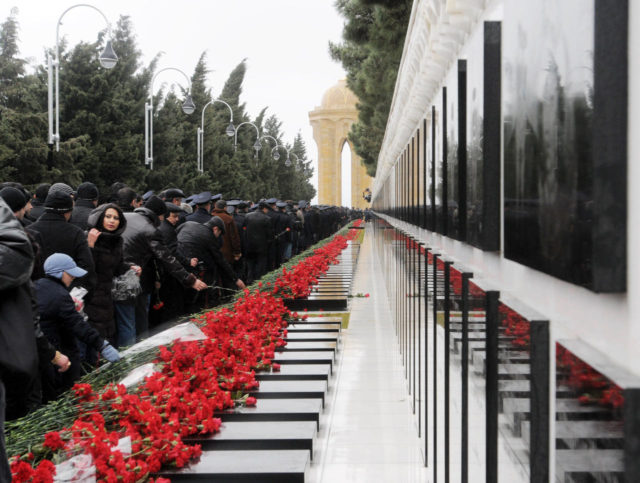
Karabakh Victory Transforming Meaning of Black January for Many Azerbaijanis
Publication: Eurasia Daily Monitor Volume: 18 Issue: 11
By:

Moscow’s brutal dispatch of more than 35,000 Soviet troops into Azerbaijan in January 1990— nominally to defend the Armenian minority there but in fact to block moves toward that republic’s independence—remains a deep wound in its national life. The Azerbaijanis to this day refer to these tragic events as Black January. Hundreds of Azerbaijani residents were killed and wounded in a viciously arbitrary manner, and a monument in their honor remains one of the most sacred and visited sites in Baku. But the outcome of the recent fighting in Karabakh, when Azerbaijan recovered much of the territory it had lost to the Armenian occupation, has introduced a dramatic change in the meaning of Black January for many. In the past, it was primarily an occasion for bitter reflection on how much Azerbaijan suffered because of Moscow’s actions and the failure to defend Azerbaijan against Armenian military actions. This year, although memorial events were limited by pandemic restrictions, it has become something else: an occasion to celebrate those who lost their lives because they showed by their heroism what a people could do if it stands up for its rights no matter what the odds.
Compared to the Soviet attacks on Vilnius and Riga a year later, Black January events in Azerbaijan are far less known. Still, they may have even greater continuing importance. They are not well known because their chronology is complicated, and Moscow has always worked hard to obscure the facts. In the weeks before Moscow invaded, Azerbaijanis tore down the border fences dividing them from the much larger community of ethnic Azerbaijanis in Iran, and the Popular Front of Azerbaijan took over many government offices around the republic. Then, on January 9, ten days before Moscow sent troops to Baku, the Supreme Soviet of the Armenian Soviet Socialist Republic (SSR) voted to make Nagorno-Karabakh, the autonomous Azerbaijani region with predominantly ethnic Armenian population, a de facto part of Armenia by including it within its budget and allowing the residents of Karabakh to vote in Armenian elections.
That outraged many Azerbaijanis, but they were especially angry at Moscow for not responding to the Armenian action. And often employing “heavily anti-Armenian rhetoric,” according to Human Rights Watch, Azerbaijanis then called for full independence from the Soviet Union with the Azerbaijani Popular Front setting up committees for the defense of the nation. Soviet officials in Baku were unable to control the situation, and they directed the 12,000 troops of the Interior Ministry to stay in their barracks lest their appearance spark violence in the city. That led to a breakdown in public order in parts of Azerbaijan and attacks on Armenians, many of whom appealed to the Soviet government to help them leave.
The Azerbaijan Popular Front took control in many regions of the republic. On January 18, 1990, it called on Baku residents to block the main access routes into the Azerbaijani capital to prevent any Soviet forces that might be sent against them. Its activists also surrounded Soviet interior force barracks. That led Soviet officials on the ground to pull back to the outskirts of the city, where they established a new command post to direct Moscow’s response. That response was not long in coming. On January 19, Mikhail Gorbachev signed a decree calling for the introduction of forces to restore order, block the Popular Front’s actions, and prevent anti-Armenian pogroms.
Almost immediately, some 35,000 Soviet troops entered the Azerbaijani capital. To justify their acts of violence, which took as many as 300 lives and left far more people wounded, Moscow propagandists claimed that Azerbaijanis had fired on them and were organizing to kill Armenians. But subsequent investigations found no evidence of either. And as a result, the Soviet attack proved counterproductive: hundreds of Azerbaijanis immediately turned in their communist party cards; and on January 22, less than two days later, the Supreme Soviet of the Azerbaijan SSR met and condemned the actions of the Soviet forces, hardly the response Moscow wanted.
In the years since, Azerbaijani leaders and the Azerbaijani people have honored the victims of the Soviet attack. But this year, despite limitations imposed as a result of the pandemic, there has been a fundamental change in how they view those past events, one brought about by Azerbaijan’s recovery of much of the territory Armenian forces had seized in the 1990s. While official statements by the Azerbaijani government and foreign diplomats’ messages remained largely without any noticeable shift (Report.az; Info24.ru; Haqqin.az, January 20, 2021), the Azerbaijani people judging from the comments gathered by Feik Medzhid, have been transformed. Instead of the anniversary being only a day of sorrow, they told him, they now viewed it as an occasion to celebrate those who had died fighting for the Azerbaijani cause (Kavkaz-uzel.eu, January 21, 2021).
One Baku resident, Azer Balaksishiyev, with whom Medzhid spoke, said that he has always gone to the memorial on January 20 feeling “sorrow and anger mixed together with a sense of futility.” “But after the 44-day war in Karabakh, which returned our lands,” he continued, “a certain spiritual calm has descended, and the sense has grown that the shahids [as the victims of January 20 are universally known in Azerbaijan] did not die in vain…They provided an example of how to struggle for the motherland even if they had no arms and could only sacrifice themselves.”
That new sense of worth among the Azerbaijanis is likely to have consequences, leading some to insist that Baku steps up its demands for accountability by Moscow, which has never been willing to hand over those behind Black January. It can also lead them and others to take greater pride in their country and insist that their own government pay greater respect to their wishes.



